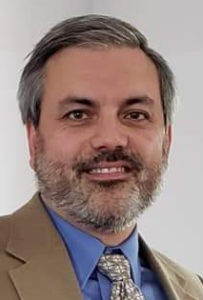At various times in the biblical narrative, the Hebrew people gathered memorial stones in sacred spaces. These rock formations served as places of remembrance for all to see and be reminded of the power and transformative nature of God. May 25, 2020, is such a marker in my life.
For more than 47 years, I lived either oblivious to or compliant with racism in our culture and in my own calloused heart of stone. The deaths of Michael Brown, Eric Garner, Tamir Rice, Breonna Taylor, Ahmaud Arbery and countless others were mere blips on my radar. I shook my head in disgust when these horrific killings happened, and then I went back to business as normal — preparing sermons and Bible studies on the need to love God and to show kindness to our neighbor.

Patrick Wilson
But, on May 25, 2020, I experienced a watershed moment.
When I learned of George Floyd’s death, something deep inside my soul burst; my stone heart cracked. For the first time in my life, I saw a racist bigot when I gazed at my own reflection in the mirror.
My privilege no longer blinded me to the reality: I was guilty of standing on the sidelines in a racist culture and idly ignoring the reality of injustice for all. I pleaded with God to bring true the words spoken to Ezekiel: “I will give you a new heart and put a new spirit in you; I will remove from you your heart of stone and give you a heart of flesh.”
May 25, 2020, became for me one of those particular moments in life’s journey that was pivotal to my growth and development as a Christ-follower. The day of my conversion, my baptism, and sacred moments of spiritual renewal previously served as significant junctures in my pilgrimage. The day that Michelle and I married and the day that our son, Joel, was born remain sacred markers in my life. In such moments, the divine hand was clearly evident as God etched words of promise, peace and presence, and I erected memorial stones of remembrance.
This latest divine encounter with God, however, caught me by complete surprise.
Just like when the Lord came to Jacob in the desert during a period of isolation and loneliness, reassuring the patriarch of his continued provision and presence, and when the Hebrew tribes crossed over the Jordan River, gathering stones from the riverbed, and when God thunderously defeated the Philistine army at Mizpah — on May 25, 2020, I began picking up memorial stones. The weight was extremely heavy.
“For weeks, I reflected as God exposed deep-seated racism throughout my life.”
For weeks, I reflected as God exposed deep-seated racism throughout my life. I recalled times in my childhood when I teased minorities on the playground or laughed as my teenage peers hurled insults at those of darker complexion. I picked up a rock as I remembered locking the car doors as I drove through minority sections of town. I grabbed another heavy stone as I mourned over decades as a pastor never once recognizing Black History Month or giving much credibility to Martin Luther King Jr. Day. I lifted another stone as I recalled all the vacations my family took to Galveston, Texas, completely unconscious of the significance of Juneteenth. Another stone raised as I evaluated the people in my network of friends and how nearly every single one of them looked just like me.
As I examined the stones in my hand, they began to cry out: “I can’t breathe!”
So, I embarked on a new journey. I watched documentaries about slavery, systemic racism and African American life (such as The 13th on Netflix, Suppressed: The Fight to Vote by BNF, The Black Church on PBS). I carved out time to really reflect as I viewed movies about injustice, brutality and hate (such as Just Mercy, Burden, Same Kind of Different as Me, and Selma). I read biographies about African American heroes and heroines to glean more of their personal life experiences and hardships (such as Harriet Tubman, Bakari Sellers, Michelle Obama, Maya Angelou). I began to read some of the great Black authors of our day, learning from their encounters with white supremacy and bigotry and their proposals for a way forward (such as Michael Eric Dyson, Ibram X. Kendi, Michelle Alexander, Ijeoma Oluo).
I began to listen, and the stones cried out louder and louder: “I can’t breathe!”
“Ashamed, I reached out to the only African American pastor I knew in my community.”
Ashamed, I reached out to the only African American pastor I knew in my community. I confessed my indifference and complicity to racism, hurling my own stones of hate or, like Saul of Tarsus, holding the cloaks of others as they “stoned” innocent lives. I repented of the countless times I consciously or subconsciously turned a blind eye to inequality around me — and I dropped the stones.
I asked for this pastor’s assistance to help me journey out of the land of complacency and comfort and to begin to build relationships with other African Americans around me. He graciously agreed and introduced me to others in my community.
With each encounter, I sought to be quick to listen and slow to speak, to hear their stories and perspectives, and to confess my naiveté and blindness to my own racism. With grace and compassion, each whispered the words of Jesus, “Let any one of you who is without sin be the first to throw a stone.”
I started journaling my experience on social media, sharing about my growth in sermons and among friends, which was met with everything from staunch animosity to embraced companionship. The more I discovered Black lives mattered to me, the more I discovered how little they matter in our society.
I began to learn, and the stones shouted even louder: “I can’t breathe!”
“The more my heart of stone is chiseled, the more the depth of my sin is exposed.”
More than nine months have passed, and still I remain at the beginning of my journey. The more my heart of stone is chiseled, the more the depth of my sin is exposed. Yet these dropped stones keep becoming memorial stones, marking my journey and God’s faithfulness to forgive, restore and renew.
If my experience mirrors what must happen in the lives of other Christ-followers, we have much more we must do. So I keep reading and watching; I keep listening and learning; I keep confessing and repenting.
Through the tears and the pain, I more clearly see Jesus and his kingdom. A kingdom built on the foundation of a cornerstone that the builders rejected and upon a rock that even the deadly stench of racism cannot overcome.
The dropped stones once intended for hatred have become memorial stones of God’s faithfulness and the foundation of change — a transformation that has only just begun in me. I continue to work toward a future when the rocks cry out with a new song sung by every nation, tribe, people and language — a song of praise.
This is a song in which we unite together as one and sing: “I can breathe!”
Patrick Wilson serves as senior pastor of Salem Avenue Baptist Church in Rolla, Mo. He is a graduate of Baylor University, earned two master’s degrees at Southwestern Baptist Theological Seminary and a doctor of ministry degree from Logsdon Seminary.


